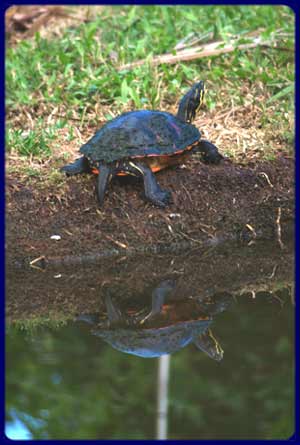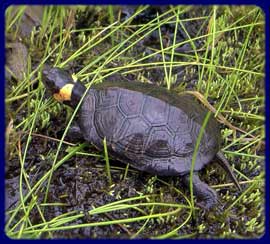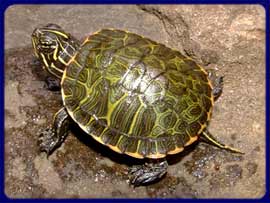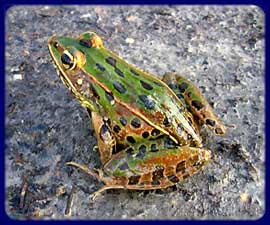 |

 |
 |
 |
 |


Redbelly Turtle Basking
(Pseudemys rubriventris) |
 |
 |
 |
 |
|
 |
 |
The Pennsylvania Field Office
In response to the growing demand for environmental surveys in Pennsylvania, Herpetological Associates, Inc. (HA) opened a Pennsylvania Field Office in 2002. Our location in Berks County, Pennsylvania, allows us to provide efficient service to clients in southeastern Pennsylvania, and throughout the Commonwealth. The Pennsylvania Field Office also provides environmental consulting to clients in Delaware, Maryland, New Jersey, and New York. Together with HA's New Jersey and Florida offices, we provide consultation to clients throughout the United States and abroad.
Specializing in surveys for the State-endangered and Federally threatened bog turtle, our staff is qualified to perform habitat evaluations (Phase I), presence or absence surveys (Phase II), and intensive trapping studies (Phase III). Our experience with the reptiles and amphibians of the region includes other Threatened and Endangered species, including the redbelly turtle, southern leopard frog, New Jersey chorus frog, and timber rattlesnake. Our services include environmental monitoring for housing or utility projects, mitigation and management plans, and research-oriented surveys.

Rare Reptiles and Amphibians of Pennsylvania
| Common Name | Scientific Name | State Status | Federal Status |
| Bog Turtle | Glyptemys muhlenbergii1 | Endangered | Threatened |
| Redbelly Turtle | Pseudemys rubriventris | Threatened | None |
| Blanding’s Turtle | Emys blandingii2 | Candidate | None |
| Eastern Massasauga | Sistrurus c. catenatus | Endangered | None |
| Timber Rattlesnake | Crotalus horridus | Candidate | None |
| Kirtland’s Snake | Clonophis kirtlandii | Endangered | None |
| Rough Green Snake | Opheodrys aestivus | Endangered | None |
| Broadhead Skink | Eumeces laticeps | Candidate | None |
| Eastern Mud Salamander | Pseudotriton m. montanus | Endangered | None |
| Green Salamander | Aneides aeneus | Threatened | None |
| Coastal Plain Leopard Frog | Rana sphenocephala3 | Endangered | None |
| Eastern Spadefoot Toad | Scaphiopus holbrookii | Endangered | None |
| New Jersey Chorus Frog | Pseudacris feriarum kalmi | Endangered | None |

1The scientific name of the bog turtle was changed from Clemmys muhlenbergii to Glyptemys muhlenbergii based on recent data. This name change does not affect the status or protection of the species.

2The scientific name of the Blanding’s turtle was changed from Emydoidea blandingii to Emys blandingii based on recent data. This name change does not affect the status or protection of the species.

3The scientific name of the Coastal Plain leopard frog was changed from Rana utricularia to Rana sphenocephala based on recent data. This name change does not affect the status or protection of the species.
|
Professional Services
 |
 |
 |
 |
 |


Bog Turtle
(Glyptemys muhlenbergii) |
 |
 |
 |
 |
|
Bog Turtle Surveys

Surveys for the Federally threatened and Pennsylvania-endangered bog turtle are a specialty of HA’s Pennsylvania Field Office. We have two Qualified Bog Turtle Surveyors, who enable us to assist private landowners, developers, utilities, and non-profit organizations with all aspects of bog turtle surveys, including:
Habitat Evaluation (Phase I Survey) — HA can perform these surveys at any time of the year, providing there is no significant snow cover. The U.S. Fish and Wildlife Service and the Pennsylvania Fish and Boat Commission also recommend that the ground not be frozen. HA suggests that you contact us for habitat assessments before April 15, in the event that Phase II surveys are necessary.
Presence/Absence Survey (Phase II Survey) — If potential habitat is present on a property, the U.S. Fish and Wildlife Service and the Pennsylvania Fish and Boat Commission will require that a Phase II survey be conducted before any clearing or development begins. This type of survey is intended to determine whether bog turtles live on the property in question. These surveys can only be conducted between April 15 and June 15 due to the seasonal activity of the bog turtle. See the full list of Guidelines for Bog Turtle Surveys  .
Trapping Survey (Phase III Survey) — HA has conducted numerous live-trapping studies for bog turtles, and we are recognized by the U.S. Fish and Wildlife Service and Pennsylvania Fish and Boat Commission as qualified trappers. Trapping is performed as an additional method for determining the presence or absence of this secretive species. HA recommends trapping for certain types of wetlands, or when Phase II surveys are initiated late in the survey window. When conducted in conjunction with a Phase II survey, trapping increases the likelihood of capturing a bog turtle. Conversely, when no turtles are caught, the use of this method increases the confidence that no turtles are present, and ensures that projects are approved in a timely fashion.
Timber Rattlesnake Surveys

 |
 |
 |
 |
 |
 |


Timber Rattlesnake
(Crotalus horridus) |
 |
 |
 |
 |
|
 |
The timber rattlesnake is considered a Candidate species, indicating that it is proposed for inclusion on Pennsylvania’s list of Threatened and Endangered species. It is currently listed as a Threatened species by the New York Department of Conservation and as an Endangered species by the New Jersey Department of Environmental Protection. Although not officially listed as Threatened or Endangered in Pennsylvania, its status as a candidate for listing still affords it a level of protection under state regulation. Any project conducted within the known range of the timber rattlesnake in Pennsylvania must first demonstrate that adverse impacts to critical habitat will be avoided. Critical habitat is defined as overwintering habitat and birthing areas, although other habitat is also considered in habitat assessments. HA has extensive experience surveying, capturing, and handling this venomous, but docile snake. See the current Timber Rattlesnake Presence-Absence Survey Guidelines  . .
Redbelly Turtle Surveys

 |
 |
 |
 |
 |


Redbelly Turtle Hatchling
(Pseudemys rubriventris) |
 |
 |
 |
 |
|
 |
 The redbelly turtle (also known as the red-bellied turtle) is one of Pennsylvania’s largest freshwater turtles, and also one of its rarest. It is currently listed as a Threatened species in Pennsylvania. Potential habitats for this turtle include ponds, lakes, and rivers. The survey period is generally restricted to April 15–July 1 due to the seasonal activity of this species. HA is qualified to conduct assessments of aquatic and nesting habitat, presence/absence surveys, and trapping surveys. HA custom builds all of our redbelly turtle traps, which include several design modifications. These have been tested in a variety of habitats, and have been used in a study for the U.S. Fish and Wildlife Service. Our work has included the original population studies at the Philadelphia International Airport, which helped produce mitigation and management recommendations as part of the airport expansion project.
The redbelly turtle (also known as the red-bellied turtle) is one of Pennsylvania’s largest freshwater turtles, and also one of its rarest. It is currently listed as a Threatened species in Pennsylvania. Potential habitats for this turtle include ponds, lakes, and rivers. The survey period is generally restricted to April 15–July 1 due to the seasonal activity of this species. HA is qualified to conduct assessments of aquatic and nesting habitat, presence/absence surveys, and trapping surveys. HA custom builds all of our redbelly turtle traps, which include several design modifications. These have been tested in a variety of habitats, and have been used in a study for the U.S. Fish and Wildlife Service. Our work has included the original population studies at the Philadelphia International Airport, which helped produce mitigation and management recommendations as part of the airport expansion project.
 |
 |
 |
 |
 |


Southern Leopard Frog
(Lithobates sphenocephalus) |
 |
 |
 |
 |
|
 |

Southern Leopard Frog and New Jersey Chorus Frog Surveys

The southern leopard frog (also known as the Coastal Plain leopard frog) and the New Jersey chorus frog are both listed as Endangered species in Pennsylvania. New Jersey chorus frogs can be found in densely vegetated wetlands or open marshes, often breeding in temporary bodies of water. Southern leopard frogs may inhabit marshes, ponds, and slow-moving streams. Both species are restricted to extreme eastern Pennsylvania, generally within the Coastal Plain. These frogs become active with the first signs of spring, and surveys are timed to correspond with their choruses of breeding calls. Surveys should be conducted between mid-March and mid-April. HA has extensive experience with these species, both in New Jersey and Pennsylvania, and is qualified to conduct surveys for potential habitat (Phase I survey), the presence/absence of the frogs (Phase II survey), and the delineation of critical habitat.

Useful links


Contact Information

Michael Torocco, President and Regional Manager
Quillyn Bickley, Assistant Regional Manager
Herpetological Associates, Inc.
Pennsylvania Field Office
1745 Westwood Road
Wyomissing, PA 19610
Phone: 610-670-1017

Michael Torocco: mtorocco@herpetologicalassociates.com

Quillyn Bickley: qbickley@herpetologicalassociates.com
 
You will need Adobe Reader to open and print PDF documents.
Click the button on the left to download Acrobat Reader. |
|
|
 |
![]()
![]()
.
![]()
![]()
![]()
![]()
![]()
![]()
![]()




